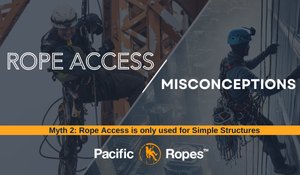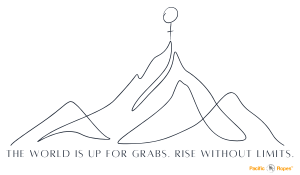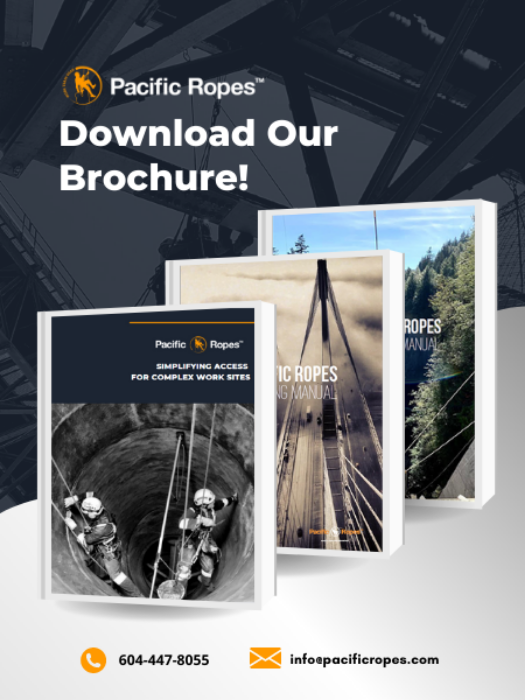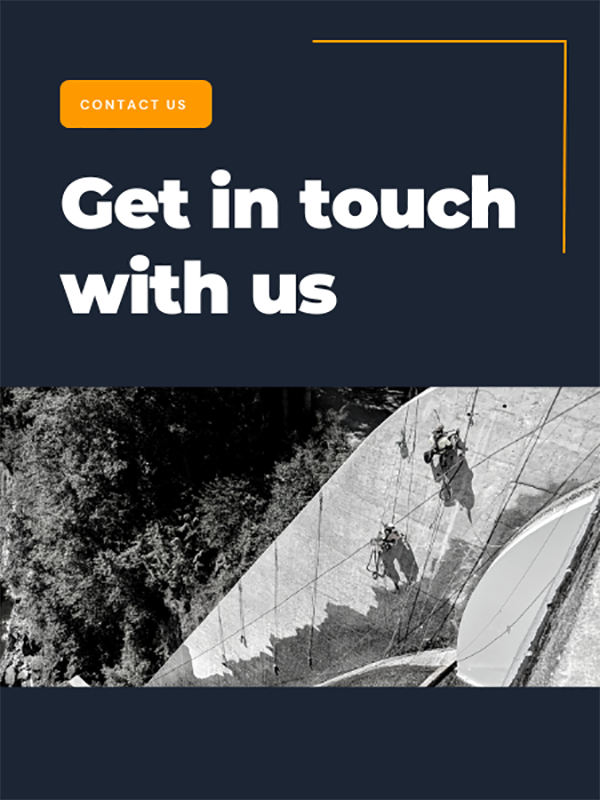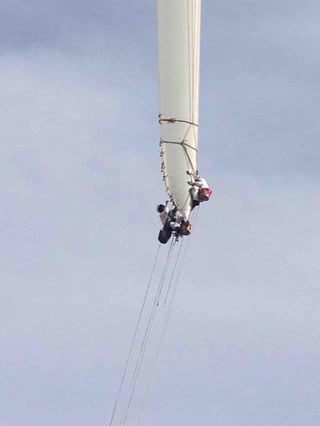
Yup, that's Pablo way up there!
As usual, our global community of amazing Rope Access technicians came through! This week, Pablo Romero Piñón offered his experience of growing his career in our ever expanding industry and within the wind economy. The wind economy is something (we have noticed) several new technicians are very interested in and excited about- as we all should be! For Pacific Ropes, when it comes to wind and Rope Access, times have never been more exciting and Pablo is living proof of this. This is unquestionably an industry where Rope Access shines as an access solution, and in most cases as we've heard and seen, it is the only solution for difficult access.
The wind economy is something Canadians are increasingly debating as its importance is quickly on the rise globally, specifically in many parts of Europe. In fact, the wind turbine/farm industry is breaking new records internally and experiencing its largest profit margin to date. What does this mean for the Rope Access industry? Well, when you break down the elemental design and construction of a wind turbine it’s a no brainer: Any work on or within this structure is going to require a unique access plan that ensures ultimate safety and work efficiency. Rope Access technicians are the go-to specialists within the wind industry as our system provides a scope of unique applications that are perfectly suited to the structural needs of any turbine. Most importantly, the wind economy is giving our community work and providing a division of our technicians with job opportunities that offer unique work experiences, travel, and awesome specialization. The globally recognized IRATA ticket is widely accepted within this industry and many companies are seeking out Rope Access technicians to keep up with the volume of work made increasingly available.
I was itching to speak with one of these techs- someone that has actually spent a great deal of time working with and on wind turbines, and Pablo came through with some insightful commentary. So, without further ado, here’s my Q & A with Pablo.
(On a personal note. Pablo’s answer to question 4 especially makes us smile. We agree).
How did you get your start in Rope Access and Why?
I´ve been working in the wind energy field since 2007. My company Gdes Wind is a worldwide leader in wind blade services, consultancy, inspection, and repair wind blades. For the repairs up-tower we always used cranes, truck platforms, etc. and in 2012 our company asked the crew about who wanted to get training in Rope Access. I remember many people were skeptical, but we said “yes” because it was something new, but many people were afraid of the height at that time. Eight people in our crew did the training (level one) and we started to perform vertical jobs. I decided to do the training because I thought it was a really good opportunity for me, to improve my skills to do something different, to get into a new world of possibilities. Then some of the crew did the next Rope Access level (level 2).We still work with cranes, lift platforms on the ground but if a customer needs or asks for a rope job we are able to do it.
What is the most common question your friends ask you when they want to know ‘what do you do’?
None of my old friends work at heights. I´m from Spain and in the last ten years I couldn´t see them much, now I´m living in the US and maybe once in a year they will call me “mad”, ”crazy.” When I send them pics they always suggest I take up a different job. I have many friends that do vertical work- they enjoy travel and get to explore other cultures at the same time. I think that is a good experience in life. Thanks to this job, I can do a lot of different things.
If you had one word to describe Rope Access what would it be?
Challenging.
Is there anything characteristic of a Rope Tech- I mean, heights aren’t for everyone!
Absolutely. I´m not an expert in Rope Access, I do wind blade repair with Rope Access level 2 trying to do my job the best I can. I like my job, I’ve been doing it for ten years. I mean, you must love the things that you do, you must like whatever you do. Your body and mind must be 100 % focused on whatever you´re doing. Other people say “Hey Man, this is a job…just a job”- I think it´s more than this. It´s a way of life.
What’s your favorite part about being on a job site?
It depends on the site. Sometimes you are working abroad and you get to experience other cultures. I´ve been to China, South Korea, all over Europe, the US, Canada, Ethiopia and I´ll remember all of these experiences for the rest of my life. Sometimes you have to work on boring sites, not as fun, but you meet new people on the site, have new experiences and you always learn something new, every day.
What is your biggest piece of advice for someone thinking about becoming a Rope Tech? And, on the flip side, what is your biggest piece of advice for a more experienced technician like yourself?
For people thinking about becoming a Rope Access tech my best advice is if you like what this look like from outside TRY, then if you like, stay and improve. In regards to an experienced tech, I don´t like to give anyone advice. But I always say, “Be safe.”
Where do you see the future of Rope Access?
Rope Access has a lot of future. You can do something with ropes almost anywhere- entertainment, sports, work. I think we are in the beginning of a long race. In green energy currently the customers always wonder if they can fix their problems with Rope Access. They need to save money for their companies, and if you compare the prices Rope Access is almost always the best option.
What is the biggest misnomer about our industry that you would like to clear up?
I think the people out of this industry have a lot of respect for Rope Access. When I come to a site and talk with the people they always respect and admire our job. Sometimes you are one hundred meters up-tower hanging on ropes and people see you and stop…sometimes they ask you questions about the heights, fears and always respect your job. Some people may think this is not a safe job, I disagree. I have had may Jobs before, in factories, plants and I can say there´re many unsafe Jobs out there. We always have to be safe every job we do, everything we do, at work, on the road, at home, etc.
What has been your most exciting work site and why?
I remember a work site in Ethiopia. It was my first time in Africa and everything was exciting for me and really hard as well. We performed Rope Access inspections in the Ashegoda wind farm in South Tigray. New continent for me, new culture, new experience. It was hard because the long trip, hard conditions, but at the same time I enjoyed it a lot. I knew many people, they are so happy with less things, this experience taught me a lot.
What continues to inspire you as someone who has given their professional life to Rope Access?
Improve my skills every day, do my job in the best way I can. Learn every day!
When did you make the transition into becoming a Wind Turbine tech? And why?
I came from a “wind blade manufacturing area”. There´re two wind blade factories close to my home town As Pontes in La Coruña (Spain). Many people worked and work in these factories and have for years. Additionally, other companies grown close to these companies. They do the “after sales job”, attending to any wind blade problem on site, sea port, on the way to the wind farm, etc. Then these companies are specialized in repair, inspect and everything that has relation with wind blade and here I am! Regarding the second part of the question, absolutely! I did the path first working with composites and then do rope works, but currently many people with Rope Access training are hired to work on wind blades. They need to learn with an experienced wind blade tech but it´s easy because we always work with two people. Here in the US we are doing currently a lot of interviewing to hire new people and there are a lot of people with Rope Access that are so interested in what we do, even if they´re not wind blade experienced techs.
What is the biggest difference working on a wind turbine site/project versus other, perhaps, more urban sites?
I´ve never worked on urban sites, I’ve always worked at wind farms.
What is your advice for techs who want to work as a supervisor or a team leader?
It´s a process. When you have experience in your field, you improve your skills and you try to do the right things at the end of the day. I think you always have to be yourself, help people, treat people well, and always with respect.
What do you think it takes to be a great leader within a Rope Access team in our Industry?
I´m not a great leader in Rope Access. I have a little bit of experience with ropes. I have a lot experience in wind blades. I guess to be a great leader in Rope Access means to be a level 3 supervisor with many years of experience and the most important thing is to be a person who has an interest in teaching and someone who loves to give instruction to new techs.
Do you see Rope Access in the Wind sector as a great opportunity that will continue into the future for Rope Techs?
Absolutely. The wind sector is asking for Rope Access techs right now and the future isn´t far, it’s here! Every company in the wind sector such as blade repair, O&M maintenance, etc. need to have a Rope Access crew.
Do you have a trade ticket? Do you see having skills in a particular trade as something that is necessary in the wind sector as a Wind Technician?
I don´t know? What´s trade ticket, sorry.
Thank you so much to Pablo for having this great conversation with us! We are always so amazed by the diverse experiences people have in this industry! So exciting!
Considering a career in rope access? Check out our training page to get started!

